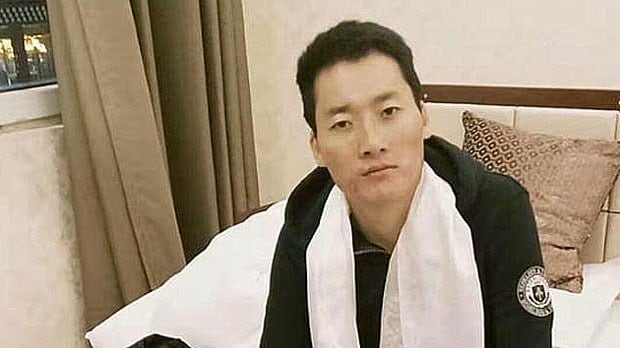Celebratory Chinese media reports about the U.S. administration’s gutting of Radio Free Asia and Voice of America has sparked widespread concern among Tibetans living in Tibet who fear they will no longer have access to uncensored news in their own language, sources in the region said.
But Tibetans say they are relieved to see that Radio Free Asia is still broadcasting into the region despite the March 15 termination of Congressionally-authorized federal grants that fund the editorially independent news service.
“We still see you. We still hear you,” said one of the sources based in Tibet’s capital Lhasa on Thursday, just days after the abrupt cut to RFA’s funds forced the outlet to furlough much of its staff in its Washington headquarters.
Chinese media and Beijing’s army of nationalistic ‘little pink’ commentators welcomed the news about RFA and VOA, with the state-owned Beijing Daily declaring that the “beacon of freedom has collapsed” and that “U.S. hegemony will eventually perish under global condemnation.”
With the reduced staff, RFA’s nine language services -- including Tibetan, Mandarin and Uyghur -- are providing limited news updates via its website, social, and radio to regions across Asia with little or no press freedom, from North Korea and China to Cambodia and Myanmar.
“I listen and follow RFA and I am relieved to see you are still working despite the funding cut and risk of closure,” a second source based in the Tibet Autonomous Region told RFA Tibetan.
“I hope and pray that the (U.S.) administration reconsiders the decision and continues to fund your work,” the person said on condition of anonymity for fear of reprisals.
Risking personal safety to listen
Under Mao Zedong, Communist Chinese forces invaded and annexed Tibet in 1950. Ever since, Beijing has maintained a tight grip on Tibetan daily life, suppressing Tibetan culture, the language and Buddhist practices while trying to assimilate Tibetans into Han Chinese culture.
In Tibet, RFA serves as a rare source of factual, timely news and information about domestic and international affairs as well as about the Tibetan spiritual leader, the Dalai Lama, who lives in northern India, and Tibetans abroad.
Many Tibetans risk personal safety to secretly tune in to RFA and VOA and listen to these broadcasts, which the Chinese government has frequently jammed, according to former political prisoners, Tibetans, rights groups and foreign tourists.
Chinese officials have also destroyed or confiscated hundreds of ‘illegal’ satellite dishes, with seizures common across the Tibet Autonomous Region and the Tibetan areas of Sichuan, Qinghai, Gansu and Yunnan provinces.
Access to RFA Tibetan’s news website and social platforms are also blocked. However, some Tibetans use digital circumvention tools to get around China’s “Great Firewall” that censors and blocks access to many Western websites and news sources, including X, formerly known as Twitter.
Getting caught listening to RFA or VOA or sharing information with foreign media can cause Tibetans to be arrested. Some have been sentenced to several years in jail.
“Hundreds of thousands of Tibetans living in Tibet -– monks, nuns, nomads, farmers and other laypersons –- try every way possible to tune in to RFA and VOA,“ said former political prisoner Golog Jigme Gyatso, who was detained by Chinese officials several times for listening to and participating in discussions on RFA Tibetan.
“Both these news American outlets play an essential role in filling a big information gap; that is why both have always been a thorn in the side of Communist China,” he said.
Chinese authorities often blast music on radio frequencies used by RFA to make it difficult for listeners to hear, said Gyatso, who is currently based in Zurich, Switzerland.
They also plant informers and spies in Tibetans villages, schools and monasteries to find out who might be listening to these news programs, he said.
“And now to hear that the two news outlets that serve as such an important medium of information inside Tibet is likely coming to an abrupt end is unthinkable and heartbreaking to say the least,” Gyatso said.
In 2008, Gyatso helped make a documentary titled “Leaving Fear Behind,”which featured interviews with Tibetans in Tibet that highlighted the injustices they face under Chinese rule. He was subsequently jailed three times between 2008 and 2012 and brutally tortured by Chinese authorities before finally escaping Tibet in 2014.
‘Darkness will fall’
Other former Tibetan political prisoners and activists also expressed concerns that RFA and VOA may cease operations, saying the services provide a lifeline of information to Tibetans in their own tongue.
RFA Tibetan, for example, broadcasts news in three different dialects of Ukay, Amkay, and Khamkay.
“If these media outlets are silenced, darkness will fall upon the minds of millions who, under authoritarian oppression, have depended solely on these voices for truth, freedom, and democracy, and their hopes will be dashed,” said Jamyang Jinpa, one of the monks who disrupted a government-controlled press tour and spoke to foreign journalists during a widely publicized protest against Chinese rule in April 2008.
Jinpa said he first heard on RFA’s Amdo-dialect broadcast that a group of international reporters had been invited to visit Labrang Tashikyil Monastery in Gansu province, and made preparations to protest before them.
“Over the past several decades, these two media outlets have served as bridges between Tibetans inside and outside Tibet and made indelible contributions to the Tibetan people,” he said. “This will be confirmed by time itself.”
‘Act of resistance’
RFA began its first broadcast into China in Mandarin on Sept. 29, 1996, and in Tibetan a few months later, on Dec. 2, 1996.
It later expanded to nine languages, including Tibetan, Uyghur, Mandarin, Cantonese, Korean, Vietnamese, Khmer, Lao and Burmese.
“When I was in Tibet in 2008 and 2011, I would hear Radio Free Asia Tibetan language service quietly being played in people’s homes at night,” said Nick Gulotta, a New York City who traveled to Tibet in 2008 and later in 2011.
“Just listening to the news was an act of resistance and extreme personal risk,” he said. “But for Tibetans resisting occupation, listening to uncensored information in their language was everything.
“Not only are these programs a lifeline for millions living under authoritarian regimes –- there are simply no other high quality media options for Americans that disseminate news in many of the languages offered by RFA and VOA,” Gulotta said.
However, there are signs that the U.S. administration is scaling back shortwave radio transmissions. RFA has learned that some shortwave radio frequencies that had carried its programming have stopped operating in recent days.
Most of RFA’s radio broadcasts are carried by transmitters run or leased by the U.S. Agency for Global Media, which oversees U.S. government-funded broadcasters.
CTA urges lobbying
Sikyong Penpa Tsering, the democratically elected president of the Tibetan government-in-exile -- the Central Tibetan Administration -- in Dharamsala, India, said CTA is striving to ensure continued U.S. support for both RFA and VOA through collective efforts of the Washington-based Office of Tibet and International Campaign for Tibet.
The CTA has also urged the over 30 North American Tibetan associations , made up of the Tibetan communities across the United States and Canada, to advocate on behalf of RFA and VOA with their representatives, he said.
“The continuation of RFA and VOA’s Tibetan language services is not only a geopolitical necessity — it is also a moral imperative," said Tsering Passang, founder and chair of the U.K.-based Global Alliance for Tibet and Persecuted Minorities.
“These broadcasts provide a rare and vital platform for Tibetan language preservation, helping sustain a culture that the CCP has relentlessly sought to erase through colonial-style boarding schools and other assimilation tactics,” he said, using an acronym to refer to the Chinese Communist Party.
Rigzin Lhundup, a member of the Tibetan parliament-in-exile, recalled how when he was younger and living in Tibet, he would see Tibetans go to the terrace of their house or to the mountainside to hear the news broadcasts better.
“Now when I reflect on it, I still feel the impact of hearing the word ‘Free’ in Radio Free Asia and the line, ‘Reporting from Dharamsala, the place of His Holiness’s residence,’ which we would frequently hear in the broadcasts,” Lhundup said.
“Shutting down the two media outlets would be a huge loss to the Tibetan struggle,” he said.
Edited by Tenzin Pema and Malcolm Foster.


